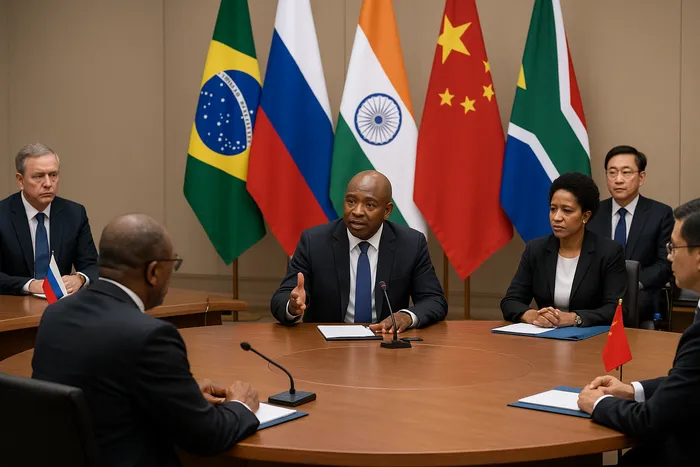BRICS+ Series: Expansion Reveals Africa’s Fault Line on UNSC Reform

BRICS expansion has unveiled significant divisions within Africa regarding the push for reform in the United Nations Security Council (UNSC). This article explores the implications of these tensions and the challenges faced by African nations in achieving a unified stance.
Image: --
The recent foreign ministers’ meeting in Rio, held in April 2025, starkly illustrated that an expanded BRICS, while promising to amplify the Global South, also introduces more points of contention. The gathering concluded without a joint communiqué, a rare silence that serves as a warning about the coalition’s capacity for difficult decisions as it grows. This outcome was driven by objections from Egypt and Ethiopia to language perceived as favouring South Africa’s bid for a permanent UNSC seat. Far from a minor procedural issue, this incident signalled the difficulty of balancing continental unity with national ambition.
Rio’s Rare Silence and Why It Matters
At the Rio meeting, disagreements over UNSC reform—specifically concerning permanent seats for Brazil, India, and South Africa—led to a significant setback. Unlike earlier disputes, the opposition this time came from Africa itself, with new BRICS members Egypt and Ethiopia rejecting Brazil’s draft text. They argued that it privileged Pretoria with a carve-out, undermining Africa’s common position.
The impasse prevented the release of a joint communiqué or even a consensus “Chair’s Summary.” While such an outcome is unusual, it reflects both the diversity of perspectives within BRICS and the coalition’s willingness to allow internal disagreement rather than impose a false unity. Yet the episode also revealed how expansion magnifies fault lines, particularly around Africa’s representation on the Security Council.
Ezulwini vs. National Ambition
At the heart of the disagreement lies the Ezulwini Consensus, the African Union’s formal demand for a minimum of two permanent UNSC seats with full veto powers and five non-permanent seats. Crucially, the AU reserves the right to designate which states will occupy these seats. The consensus is deliberately vague on beneficiaries, preserving continental unity by deferring competition.
However, this ambiguity clashes with national campaigns for permanent membership. South Africa has long positioned itself as Africa’s candidate, but with Egypt and Ethiopia joining BRICS, its claim is now openly contested.
The language of BRICS declarations over recent years demonstrates this evolution.
- Beijing Declaration (2022): supported a greater role for Brazil, India, and South Africa, but avoided explicit endorsement of permanent seats.
- Johannesburg II Declaration (2023): advanced the discussion by naming Brazil, India, and South Africa directly, adding “including [the UN] Security Council.”
- Kazan Declaration (2024): after Egypt and Ethiopia joined, shifted away from individual African aspirants, instead reaffirming the Ezulwini Consensus.
This trajectory illustrates how BRICS’ expansion into Africa realigned its position towards the AU’s collective stance, rather than national claims.
Brazil and India’s Frustration Meets Africa’s Red Lines
Brazil, supported more cautiously by India, sought to reinsert language in Rio that recognised their longstanding aspirations—and initially, South Africa’s. Egypt and Ethiopia objected, insisting that any reference to a specific African state undermined the AU’s authority under Ezulwini. Even after Pretoria’s explicit mention was removed, they withheld support, signalling that their opposition was principled rather than tactical.
This outcome was predictable once BRICS admitted multiple African contenders. What had previously been managed through Pretoria’s role as sole African representative is now subject to intra-African competition, with Egypt and Ethiopia determined not to concede ground.
Ezulwini’s Strength Is Also Its Strategic Liability
Africa’s collective stance, while morally unassailable, suffers from operational rigidity. The insistence on two permanent seats with veto powers, coupled with AU-nominated candidates, has slowed reform progress in New York and now complicates coalition-building within BRICS.
International partners often voice support for “African representation” but avoid committing to the specifics of Ezulwini. Even Africa’s closest allies opt for ambiguity over endorsement. Without a more adaptable approach, Africa risks being present but politically ineffective when negotiations accelerate.
A pragmatic strategy would retain Ezulwini as the guiding principle while introducing a time-bound AU process to designate candidates and sequence their bids. This would allow Africa to engage constructively with partners like Brazil and India, securing reciprocal endorsements within BRICS documentation.
South Africa’s Narrowing Window
South Africa’s once privileged position as BRICS’ sole African member has eroded. The entry of Egypt and Ethiopia has diluted Pretoria’s influence and constrained its room for manoeuvre.
Pretoria now faces a dilemma:
- It cannot defy the AU without jeopardising its African legitimacy.
- Nor can it quietly court Russian and Chinese backing without triggering continental backlash.
The Rio impasse demonstrates that Africa’s gatekeeping role is real, extending beyond AU communiqués to the behaviour of African BRICS members themselves. To preserve its leadership, South Africa should pivot towards driving the AU process—pushing for criteria, timelines, and a roster—rather than campaigning unilaterally within BRICS.
What This Means for BRICS
The credibility of BRICS depends on its ability to turn rhetoric into institutional outcomes. Expansion has continued—Indonesia became a full member in January 2025, with others designated as “partner countries”—but growth without convergence raises the cost of consensus.
The 2025 Rio leaders’ declaration, which affirmed Ezulwini but skirted the questions of “who, when, and how,” epitomises this lowest-common-denominator outcome.
Africa is right to demand equitable representation, but risks undermining itself by prioritising procedure over strategy. Unless the AU quickly operationalises Ezulwini—setting timelines, criteria, and nominees—others will set the terms of reform. BRICS will continue to champion change in principle while evading the hard choices necessary for real progress.
Written By:
*Dr Iqbal Survé
Past chairman of the BRICS Business Council and co-chairman of the BRICS Media Forum and the BRNN
*Sesona Mdlokovana
Associate at BRICS+ Consulting Group
Africa Specialist
** MORE ARTICLES ON OUR WEBSITE https://bricscg.com/
** Follow https://x.com/brics_daily on X/Twitter for daily BRICS+ updates